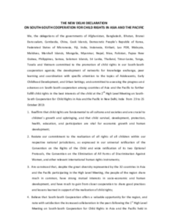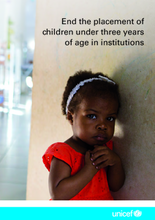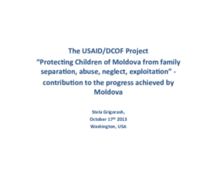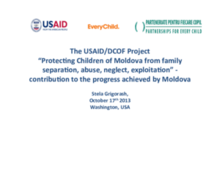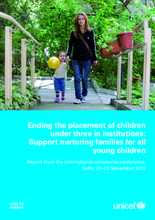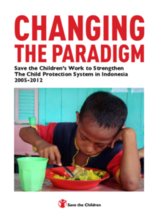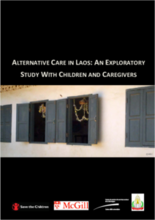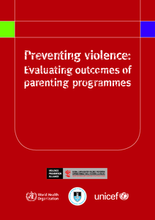Displaying 701 - 710 of 947
A New Delhi Declaration renewing governments' commitments to the rights of children and pledging to support each other in the achievement of those rights, was adopted unanimously on 25th October 2013 by 32 Asian and Pacific States attending the Second High Level Meeting on South-South Cooperation for Child Rights in Asia and the Pacific.
On the 22nd October 2013, a new regional campaign in the Latin American and Caribbean region was launched to end the placement of children under three years of age in institutions.
The second of two important presentations by Dr. Stela Grigorash, the Director of Partnerships for EveryChild Moldova, on the important work and lessons learnt in reforming the care system in that country.
The first of two important presentations by Dr. Stela Grigorash, the Director of Partnerships for EveryChild Moldova, on the important work and lessons learnt in reforming the care system in that country.
In this video, Philip A. Fisher, a senior fellow at the Center on the Developing Child at Harvard University presents at NBC News’ 2013 Education Nation Summit, explaining why positive, reciprocal interactions between caregivers and children can have enormous positive effects on children’s development and lay the groundwork for a prosperous future.
This study uses data from The China Health and Nutrition Survey to determine trends in grandparents’ provision of childcare.
This Report from the international ministerial conference, held in Sofia, 21–22 November 2012, entitled 'Ending the placement of children under three in institutions: support nurturing families for all young children', brings together the presentations, political commitments and priority actions identified by the participants, including 20 governments from Eastern Europe and Central Asia.
This report documents the work conducted by Save the Children in collaboration with the Indonesian Ministry of Social Affairs over a period of 7 years to strengthen the national child protection system and change the underlying paradigm for that system away from over-reliance on residential care and towards child and family centered responses.
This report summarizes the findings of a study on parental and alternative childcare in Luang Prabang and Xayabury provinces in Northern Lao People’s Democratic Republic.
This report seeks to increase understanding of the need for, and the process of, conducting outcome evaluations of parenting programmes in low- and middle-income countries. The guidance is aimed at policy-makers; programme planners and developers; high-level practitioners in government ministries; representatives of nongovernmental and community-based organizations; and donors working in the area of violence prevention.

